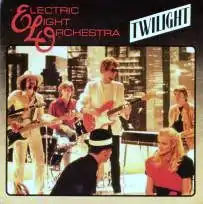| "Twilight" | ||||
|---|---|---|---|---|
 | ||||
| Single by Electric Light Orchestra | ||||
| from the album Time | ||||
| B-side | "Julie Don't Live Here" | |||
| Released | 16 October 1981 (UK) November 1981 (US) | |||
| Recorded | 1981 | |||
| Studio | Musicland Studios, Munich | |||
| Genre | ||||
| Length | 3:37 | |||
| Label | Jet | |||
| Songwriter(s) | Jeff Lynne | |||
| Producer(s) | Jeff Lynne | |||
| Electric Light Orchestra singles chronology | ||||
| ||||
| Time track listing | ||||
13 tracks
| ||||
| Music video | ||||
| "Twilight" on YouTube | ||||
"Twilight" is a song written by Jeff Lynne for English rock band Electric Light Orchestra (ELO), originally released on their 1981 album Time. The lyrics tell of a man who falls asleep while in a twilight state, where he imagines everything in his life that is going to happen to him. They contribute to the album's overarching theme of time travel.[1] ELO writer Barry Delve says that "a cacophony of sound effects...transport us chaotically to the year 2095" to start the album and that the song "doesn't stop or pause for at least 2 minutes," making the song "one of the most exciting experiences ELO ever gave you."[2] Delve suggests that the piano break is influenced by Sergei Rachmaninoff.[2] Billboard said that it was "more intricate" than most ELO songs and that "a grand orchestral build coincides with swirling vocal harmonies for great effect."[3] Record World said that it has "roller-coaster surges of angelic voices and awesome strings."[4] Messenger-Press critic Steve Wosahla said that "Twilight" "indicates that ELO may never get away from Jeff Lynne's accessibly spacey pop pizzaz."[5] Cincinnati Post critic Jerry Stein said that it "is a pounding tune but still has that soaring arrangement favored by the Beatles in so many of their uptempo songs.[6]
It was the second single released from the album, peaking at number 30 on the UK Singles Chart and number 38 on the US Billboard Hot 100. Delve explains the single's relatively poor performance despite his thinking that it is "A-grade ELO" saying that "with Time conceived and realized as a running narrative rather than a series of unconnected songs heard in isolation, many of the lyrics are quite esoteric with their talk of such things as time transporters and baffling references to the 1980s as if they were in the distant past which would have made less sense when heard out of context on top-40 radio stations."[2]
Charts
| Chart (1981) | Peak position |
|---|---|
| Australia Kent Music Report[7] | 93 |
| Austrian Ö3 Austria Top 40[8] | 15 |
| Dutch GfK chart[9] | 18 |
| French SNEP Singles Chart | 10 |
| German Media Control Singles Chart[10] | 17 |
| Irish Singles Chart[11] | 18 |
| UK Singles Chart[12] | 30 |
| US Billboard Hot 100[13] | 38 |
| US Cash Box Top 100 Singles | 38 |
| US Record World Singles[14] | 39 |
| US Radio & Records (R&R)[15][16] | 25 |
In popular culture
It appeared, with authorisation and credit, in a 1982 Japanese advertisement for the Toyota Celica XX.[17] It was also used as the finale song in the 2009-2010 Burton Snowboards film The B Movie, featuring most of the Burton team snowboarding on a "B" built out of snow.[18]
Daicon IV
The song was used (without authorisation)[19] as the theme music for the opening animation to the 1983 Daicon IV science fiction convention in Osaka.[20] In 2005, as an homage to the Daicon IV animation, the song was used as the opening theme of the television series Train Man, which features an otaku as the main character.[20] As a similar homage, it has served as the opening song for the anime convention Otakon's AMV contest since 2008, with the exception of 2017.[21]
References
- ↑ Lynne, Jeff (1981). "Innerview" (Interview). Interviewed by Jim Ladd. KMET.
- 1 2 3 Delve, Barry (2021). Electric Light Orchestra: Every Album, Every Song. Sonicbond. p. 96. ISBN 9781789521528.
- ↑ "Top Single Picks". Billboard. October 17, 1981. p. 79. Retrieved 2023-01-21.
- ↑ "Hits of the Week" (PDF). Record World. October 17, 1981. p. 1. Retrieved 2023-03-01.
- ↑ Wosahla, Steve (September 17, 1981). "In the Groove". Messenger-Press. p. 6. Retrieved 2023-03-10 – via newspapers.com.
- ↑ Stein, Jerry (November 9, 1981). "Electric Light: mining Beatles' load". Cincinnati Post. p. 7B. Retrieved 2023-03-10 – via newspapers.com.
- ↑ Kent, David (1993). Australian Chart Book 1970–1992. St Ives, NSW: Australian Chart Book. ISBN 0-646-11917-6.
- ↑ "Discographie Electric Light Orchestra". austriancharts.at. Retrieved 6 March 2013.
- ↑ Hung, Steffen. "Discografie Electric Light Orchestra". dutchcharts.nl. Retrieved 22 April 2013.
- ↑ "charts.de - Electric Light Orchestra". charts.de. Archived from the original on September 12, 2014. Retrieved 22 April 2013.
- ↑ "The Irish Charts - All there is to know". Irishcharts.ie. Retrieved 6 March 2013. Enter Electric Light Orchestra in the Search by Artist field, then click Search.
- ↑ "Electric Light Orchestra". Official Charts Company. Retrieved 5 March 2013.
- ↑ "Electric Light Orchestra - Awards". AllMusic. Retrieved 5 March 2013.
- ↑ Hawtin, Steve. "Song artist 171 - Electric Light Orchestra". Tsort.info. Retrieved 2 May 2013.
- ↑ ELO
- ↑ Charts!
- ↑ "1982 TOYOTA CELICA Ad". YouTube.
- ↑ "Twilight by Electric Light Orchestra". SnowboardingFilms.net. Retrieved 2023-03-01.
- ↑ Eng, Lawrence. "Daicon III and IV Opening Animations : Laserdisc and other Media". Cornell Japanese Animation Society. Retrieved 30 November 2015.
- 1 2 Eng, Lawrence. "Daicon III and IV Opening Animations - Trivia". Cornell Japanese Animation Society. Retrieved 21 October 2015.
- ↑ "AMV - Video Information: The Otakon 2008 AMV Contest Intro". Retrieved 27 January 2014.